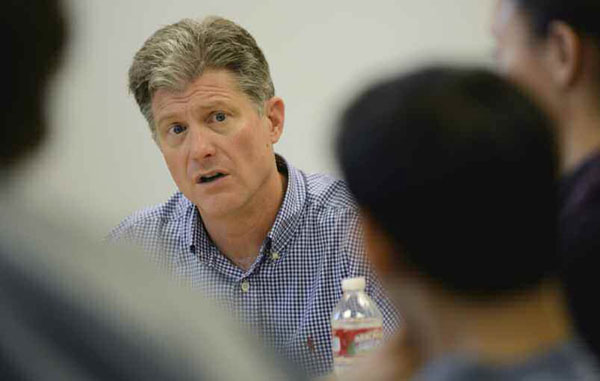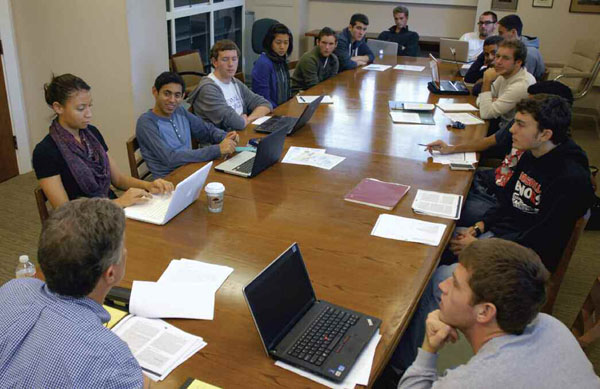
In today’s session of Professor John Seery’s critical inquiry seminar on The Idea of Money, the class discussion focuses on the 1904 Max Weber book, The Protestant Ethic and the Spirit of Capitalism. The first- year students cover a range of topics, including plans to attend a taping of the TV game show The Price Is Right and whether Benjamin Franklin’s aphorism “Time is money” applies to their lives.
Seery: So what do you think of the argument that capitalism is not just accumulation? In fact, Weber says it involves restraint. This is his thesis: that capitalism in the West, under the direction of a particular form of Protestantism, brought two otherwise contradictory psychological impulses together—acquisitiveness and asceticism. You have to be self-abdicating in order to accumulate.
Nico: I think it makes a lot of sense in terms of what we’ve seen so far in this class—especially when we looked at visual art as well as music, with people throwing money in the air and that being satisfying to them; having and showing off money as an end, rather than a means of acquiring goods. The most basic depiction was the toilet roll of dollar bills—“Look, I have all this money; who cares about spending it on toilet paper?”
Sam: Kind of weird, because it seems to put more value on the potential purchasing money has, as opposed to actually purchasing items. You have this number associated with your name, which has more prestige than having all these other items that have 10 times more use.
Seery: This religious idea—let’s follow his logic. Weber thinks that early Puritans worked hard, became capitalists for the sake of redemption. But then once you get that rational, intensive activity in place, we forget about the religious motivation and start to have people pursuing goods for their own sake, forgetting what it meant in a religious scheme of things.
Noah: That’s where Ben Franklin comes in. He basically says be acquisitive in order to have good virtues.
Seery: Do you think of your life in terms of “time is money”? If you started to think of your activity in this classroom as foregone billable hours, and you’re not billing anyone right now, don’t you realize you’re really wasting your time?
Casey: I feel like it trivializes your time if your time is just about money.
Seery: And you have something better to do?
Casey: I probably don’t, but I like to think that I do (laughs).
Seery: It’s the work ethic, and it’s not for the sake of redemption, worldly or otherworldly; it’s what Weber would call Faustian, striving for the sake of striving. You’re on a treadmill, and do we understand the ends to which we’re directed? Is it possible for you to go out and smell the roses? Or do you think in Ben Franklin terms—time is money, I have to produce?
Erik: I can’t exactly agree that time is money; from my standpoint time is extremely valuable. I kind of think that I have this calling, that I’m obligated to spend my time productively, and if I’m not, I’m letting go of a duty I have. I can’t place that duty, and it makes me believe in how Weber ties that back to a religious sense.
Seery: Erik, when you surf, are you thinking, I have two hours where I can really surf well and be the best surfer I can, or are you thinking this is time out?
Erik: No, it’s time that I value; to me it’s time that is productive; it’s good exercise and it’s fun. That’s why I sort of disagree that time is money. Because time to me is valuable, so if I’m valuing my time, I’m being productive.
Seery: It’s a valuable expenditure and you don’t see it as wasteful; it’s kind of a par with billable hours.
Casey: It’s kind of a cost-benefit analysis. Would you give it up for a certain amount of money?
Erik: Absolutely. Permanently? No. Not for any amount of money.
Seery: For most of the book Weber is being analytical, and you don’t get the sense he’s being judgmental. But, by the end, there is a critique where he says material goods have gained an increasing and inexorable power over the lives of men. Ouch, the searing indictment. The Puritans wanted work to be a calling, but now we are forced to do so. In Weber’s view, the care for external goods should lie on the shoulders like a saint wearing a light cloak. But he says that the cloak has instead become an iron cage.
The Course: The Idea of Money
The catalog course description for this critical inquiry seminar reads: “Students will examine the idea of money, drawing from political theory, philosophy, religion, economics, anthropology, history and literature. As a culminating project we will play the lottery and, if we win, we’ll be better positioned to test our ideas against reality.”
The Professor: John Seery
A member of Pomona’s faculty since 1990, John Seery is the George Irving Thompson Memorial Professor of Government and professor of politics. He earned his B.A. from Amherst College and an M.A. and Ph.D. from UC Berkeley. A two-time winner of Pomona’s Wig Award for Excellence in Teaching, Seery received the Phi Beta Kappa Society’s Sidney Hook Memorial Award in 2009 and served as the Laurance S. Rockefeller Visiting Professor for Distinguished Teaching at Princeton University in 2010-2011. His books have been on the topics of irony, death, liberal arts education, constitutional age requirements and Walt Whitman.
Samples from the reading list:
Marcel Mauss, The Gift: The Form and Reason for Exchange in Archaic Societies
Michael Sandal, What Money Can’t Buy: The Moral Limits of Markets
Max Weber, The Protestant Ethic and the Spirit of Capitalism
David Wolman, The End of Money: Counterfeiters, Preachers, Techies, Dreamers—and the Coming Cashless Society
Selections from works by Adam Smith, John Locke, Karl Marx, Friedrich Hayek and Ludwig von Mises, Andrew Carnegie, William Shakespeare and Sigmund Freud.

